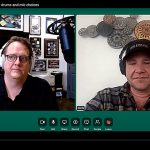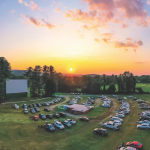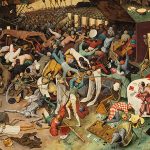Of the top 10 music touring acts on Pollstar’s chart as of late April, two date back to the 1970s (the Eagles, Bruce Springsteen & the E Street Band); two more hit their peaks in the 1980s (Metallica, Van Halen); the 1990s are represented by the Dave Matthews Band, Pearl Jam, Counting Crows, Radiohead and the Stone Temple Pilots.
The tenth touring act, the duet outing by Robert Plant and Alison Krauss at number 10, is kind of a hybrid of the 1960/70s and the 1990s and a one-off to support their remarkable 2007 album. It might also be keeping Robert Plant’s pipes in good shape after Led Zeppelin’s reunion concert late last year in London, which has raised rampant speculation about a Led Zep tour going out later in 2008 or in ’09 (despite Plant’s denials).
Buying on Revenue
But what the list does underscore is the fact that the music industry has come to rely more and more heavily on revenues derived from live performances, specifically lengthy tours, at a time when many of the biggest ticket-makers are artists whose origins can be carbon-dated. What happens when those artists reach the point at which they cannot or (authentically) do not want to subject themselves to the rigors of the road anymore?
The respect-your-elders theme has been in place for some time. In 2007, of the nine top-grossing music tours (I’m leaving out Cirque Du Soleil for obvious reasons), four ¬— The Police, Genesis, Rod Stewart and Roger Waters — accounted for about $464 million, nearly 60 percent of the approximately $803 million the top nine totaled for the year. The previous year, the Rolling Stones led the pack with $437 million (total for the Bigger Bang tour that kicked off in 2005), followed by Madonna’s Confessions tour, who booked $195 million in ducats. The year had lots of other aging (or, if you prefer, ageless) touring successes including Bon Jovi, Aerosmith and Motley Crüe. Back in 2005, it was U2, the Eagles again, Paul McCartney, Rod Stewart, Elton John and Jimmy Buffett — six of the top 10 who had their first hits before 1975.
The fact that the modern concert industry has consistently been fueled by artists that have been around for decades is a topic that’s come up frequently and plenty of explanations are available, including the Boomer phenomenon and the subjective but persistent assertion that they simply made better music back then. The point isn’t to marvel at how long one can keep touring, but rather to ponder how much longer they — and fans willing to pay huge sums for tickets — can keep it up.
Ticket Sales vs. CD Sales
In a reversal of fortune from the early days of rock, when the top touring bands also had the top-selling records, headlining tours came hot on the heels of initial record sales success. The Beatles, for instance, led the North American tour charts in 1964 and 1965 even as they were charting a string of hits on the radio. (No point in reporting grosses since the value of the dollar has changed so radically since then, but their 1964 U.S. tour reportedly had cash advances larger than any in entertainment history at the time.) But the music industry has also changed radically, with prerecorded sales plummeting steadily since 2002. Fall Out Boy was one of the few new acts that could correlate good tour numbers to good (relatively speaking) CD sales in 2006. The band grossed $11 million in sales, but more importantly, they sold nearly 400,000 tickets, which was more than all but eight acts on the Top 100 that year.
The Future
So, who’s going to keep the engine of live performances running? Radiohead? Green Day? Carrie Underwood? Hannah Montana?
Don’t laugh — Miley Cyrus booked $36 million in tickets sales last year, putting her tour at number 16 for the year. Country music also seems to be putting more of its minions into the top of the mainstream touring charts: Tim McGraw, Faith Hill, Rascal Flatts and Toby Keith all made the top 20 in 2007, with Brad Paisley and Keith Urban showing strong increases. Another trend is the increasing popularity of spin-offs from other media. American Idols Live, Dancing With the Stars and High School Musical The Concert all made Pollstar’s top 50 tours for the year.
The future of live touring music might be more like the way the prerecorded music business is headed: a smaller core of best-selling artists surrounded by a huge mass of mid-market acts working on an increasingly regional basis. Pollstar’s 2007 year-end analysis shows a fall-off in ticket sales by nearly 2 million tickets sold, centered mostly in the mega-gross category. That suggests that the mega-touring artists — the still robust relics of past decades — are both slowing down and are not likely to be replaced on the same scale.
There are two key trends to be aware of. First, the number of festivals is increasing. New entrants this year are Outside Lands Festival in San Francisco, headlined by Beck, Wilco, Radiohead and Tom Petty; Mile High Music Festival in Commerce City, Colo., with the Dave Matthews Band, John Mayer and Tom Petty; All Points West Music & Arts Festival in Jersey City, N.J., headlined by Radiohead and Jack Johnson; and Rothbury Festival, in Rothbury, Mich., with Matthews, John Mayer and Widespread Panic. Secondly, festivals are less and less peripatetic than in past years. Lollapalooza transformed from a traveling circus to a permanent fixture in Chicago’s Grant Park.
Regional Aggregation
This regional aggregation of live music has implications for the live sound business. The larger players will need more systems for more and smaller shows and will have more competition at the regional level, thanks to increasingly sophisticated and less-costly technology. Festival contracts will become more crucial and could start to be locked up for years at a time. Digital FOH and monitor consoles have already transformed the festival business by making changeovers vastly faster, allowing more stages and performers at these gatherings, another factor that will continue to boost festival growth.
The end of the Paleolithic era of live music is inevitable and, in the long run, positive, allowing the live music industry to evolve along the same lines as the recorded music business. But I’d still like to see Led Zeppelin one more time…
Contact Dan at ddaley@fohonline.com



